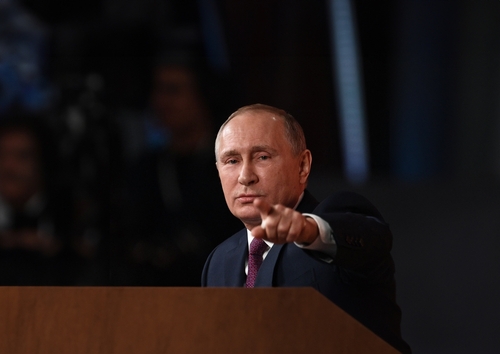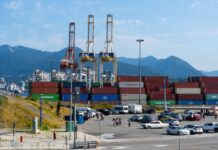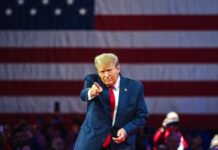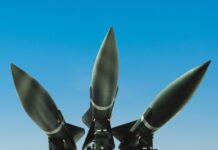
Russia’s continued escalation of its nuclear rhetoric has intensified global fears as the war in Ukraine grinds on, raising questions about the potential use of weapons of mass destruction in the conflict. Recent statements from Moscow have heightened concerns, especially as the Kremlin warns of dire consequences if its territory—specifically regions annexed from Ukraine—is further threatened. Russian President Vladimir Putin has hinted that nuclear weapons could be deployed if the situation escalates beyond control, a chilling signal that has the West and NATO on high alert.
Since the war began in February 2022, Russia has frequently used nuclear threats to prevent direct intervention by the United States and NATO. Western countries have supplied Ukraine with military aid, but they have refrained from sending troops, wary of triggering a nuclear confrontation. NATO, in response, has maintained a deterrent posture, relying heavily on its nuclear capabilities, with leaders reaffirming that the alliance is prepared to meet any threat with a credible defense. Putin’s latest warnings follow a series of setbacks in Ukraine, where Russian forces have struggled to maintain control in key areas.
🇷🇺🇺🇦UKRAINE TRIES TO START NUCLEAR APOCALYPSE BY ATTACKING NUKE POWER PLANT in pre-war Russia’s Kursk region, reportedly with at least 4 missiles that are all shot down by air defenses just 3 MILES from power station.
Watch moment secondary explosion rocks impact site (left… pic.twitter.com/tQwlGf7nsk
— Emeka Gift Official (@EmekaGift100) October 3, 2024
The shift in tone from Moscow appears to reflect its increasing desperation. After Ukraine successfully reclaimed portions of the territory Russia had annexed, including parts of Donetsk and Zaporizhzhia, Putin’s administration began elevating its nuclear threats. Analysts believe Russia sees Crimea as an especially crucial strategic region and may resort to extreme measures to hold onto it. Ukraine's ability to strike targets in Crimea, including the Kerch Strait Bridge, has further alarmed Russian leaders. While no immediate nuclear response followed those attacks, the Kremlin has made it clear that any attempts to push further into Russian-controlled areas could result in catastrophic consequences.
The global ramifications of Russia’s nuclear saber-rattling extend beyond Europe. For many nations, particularly those reliant on nuclear non-proliferation treaties, the war in Ukraine represents a failure of the international security order. Ukraine, once home to one of the largest nuclear arsenals, relinquished its weapons in the 1990s under the Budapest Memorandum, a treaty that promised its sovereignty would be respected. Russia’s invasion has shattered those guarantees, calling into question the effectiveness of disarmament agreements and emboldening other nations to reconsider their security policies.
Simulation of a retaliatory strike against Russia after Putin uses nuclear weapons pic.twitter.com/rq4F7VAOeV
— Historic Vids (@historyinmemes) April 21, 2024
Experts have warned that if Russia does resort to nuclear weapons, it would likely deploy tactical nuclear arms rather than strategic warheads. Tactical nukes, designed for battlefield use, have smaller yields and are intended to disable military targets without causing widespread destruction. However, any use of such weapons would cross a dangerous threshold, potentially drawing NATO into direct conflict. NATO officials have reiterated that while they do not seek a confrontation with Russia, the alliance is prepared to defend its members and respond proportionately if necessary.
International reactions have been swift, with many governments condemning Russia’s nuclear rhetoric. U.S. President Joe Biden, alongside other Western leaders, has warned Putin against any use of nuclear weapons, asserting that such an action would "change the nature of the conflict" and lead to unprecedented consequences for Russia. Despite these warnings, Moscow’s veiled threats have not subsided, leaving many to wonder how far Putin is willing to go as his military faces growing losses on the battlefield.
As winter approaches, Ukraine is bracing for potential Russian attacks on its energy infrastructure, with President Volodymyr Zelensky warning that Russia may strike the country's remaining operational nuclear power plants. These moves are part of a broader effort to cripple Ukraine’s economy and morale as the war drags into its third year.
The ongoing conflict, coupled with Russia’s nuclear posturing, has pushed the world closer to a dangerous precipice. The war has not only reshaped the geopolitical landscape but also revived the specter of nuclear warfare, a threat that many had hoped was relegated to the Cold War era. With both sides digging in for a protracted fight, the potential for miscalculation looms large, leaving the international community on edge.








